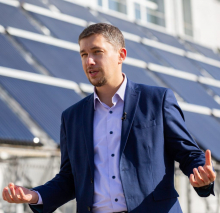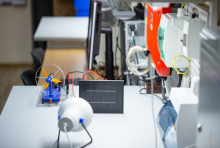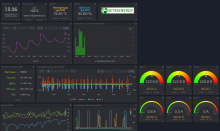Five universities, four countries and one objective: turning universities into sustainable buildings. And a “know-how transfer” that is going from a Partner Country to European states. NET4SENERGY is a project working to increase the energy efficiency of leading universities within the Hungarian, Slovak, Romanian and Ukrainian cross-border region. With the funding from HUSKROUA ENI CBC programme, the project has built a solid cooperation network at the institutional level: now it is creating its own sustainability plan and testing its effectiveness on the ground. The result? We have asked directly the project coordinator, Maksym Karpash, who is also a Professor at Ivano-Frankivsk National Technical University of Oil and Gas (leading partner of the project), in Ukraine.
What is the problem addressed by the project?
Universities are one of the largest energy consumers in Ivano-Frankivsk Oblast (Ukraine), that is why optimising the heat and electricity consumption is quite relevant. This problem is not only inherent to Ukraine, but also to our European neighbours: universities in Hungary, Slovakia and Romania have the same concern. In that sense, the ENI CBC instrument creates the perfect conditions for an exchange of ideas and good practices with partners, helping to achieve synergies.
A network of energy sustainable universities across borders: what are you committed to?
We are five universities committed to becoming proactive agents of our own change into energy-efficient buildings. The project is the result of ten years of well-established cooperation between the different institutions: the Ivano-Frankivsk National Technical University of Oil and Gas (IFNTUNG University) in Ukraine; the Technical University in Kosice, in Slovakia; the University of Miskolc in Hungary and the Technical University of Cluj-Napoca and University Center in Baia Mare, Romania. We have also realised how important it is to involve more partners in the initiative, especially, when it comes to local authorities. They have been very active during the implementation activities and have become essential in the dissemination of the project results.
How exactly are you achieving your goals?
We are elaborating and adopting our own sustainable energy action plans. These are reports in which we describe in detail the current situation at each university; we take into account the regulatory framework, the management obligations, and we come up with tailor-made measures aimed at reducing the building’s energy consumption. These will impact on real cost-savings, and on decreasing greenhouse gases emission. We have also created a pilot monitoring system to control energy consumption in one of IFNTUNG University buildings, in Ukraine. This is a unique installation, one of its kind, that provides us with precise data on the consumption of electricity, heat and cold or hot water. The data is available real-time in any electronic device (PC, tablet or smartphone) and stored on the cloud for further analysis. The information obtained from this system allows us to estimate the specific thermal characteristics of the building. We analyze the real consumption and possible trends, and we extract several indicators of the building microclimate. Such data will help us assess the real effect of the energy-efficiency action plan – that is to say – whether the measures taken have reduced the energy consumption in the building.
Will the results be shared with the rest of the community? If so, how?
This kind of monitoring installation is at the frontline of both Ukraine and the rest of Europe. From this perspective, IFNTUNG University will share with other educational institutions its experience. In fact, our University has already developed and distributed energy management standards to 46 Universities in Ukraine, in order to help them improve the sustainability of their energy resources. It’s also a positive example of a non-European partner that delivers solutions and provides knowledge-transfer towards EU Member States partners, in Hungary, Slovakia and Romania. They are also sharing all this with more universities.
TESIM: https://tesim-enicbc.eu/voices/interview/maksym-karpash/




